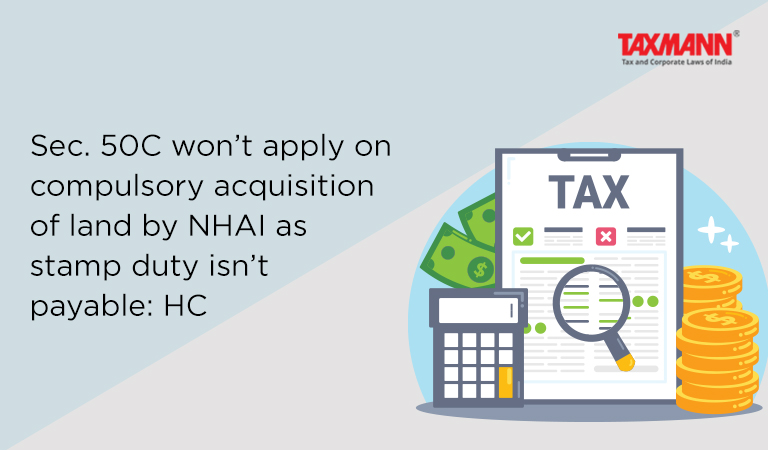Sec. 50C won’t apply on compulsory acquisition of land by NHAI as stamp duty isn’t payable: HC
- Blog|News|Income Tax|
- 2 Min Read
- By Taxmann
- |
- Last Updated on 4 March, 2023

Case Details: PCIT v. Durgapur Projects Ltd - [2023] 148 taxmann.com 50 (Calcutta)
Judiciary and Counsel Details
-
- T. S. Sivagnanam & Hiranmay Bhattacharyya, JJ.
- Vipul Kundalia & Amit Sharma for the Appellant.
- Sumit Ghosh, Anupam Dey, Souradeep Majumdar & Bhaskar Sengupta, Advs. for the Respondent.
Facts of the Case
Assessee, a company, transferred land under compulsory acquisition to the National Highways Authority of India (NHAI). During the assessment proceedings, the Assessing Officer (AO) computed the capital gains on such land by considering the provisions under section 50C i.e., considering the stamp duty value of such land.
On appeal, CIT(A) deleted the additions made by AO which was further ratified by the Tribunal. The matter then reached the Calcutta High Court.
High Court Held
The Court held that Section 50 of the Act was designed to control the transaction where the correct market value is not mentioned and there is suppression of the correct value by the parties to the transactions.
In the instant case, the land was acquired by the Government by way of compulsory acquisition. The transfer of land was not a result of an agreement between the parties but on account of compulsory acquisition. Thus, there is no room to suspect the correct valuation and the apparent consideration reflected in the sale documents.
It is a widely known fact that the compensation for compulsory acquisition is much lesser than the fair market value of the property as the value is determined by taking into various factors. This is the reason that the Act provides for appellate and other remedies if the owner is offered inadequate compensation.
Therefore, the question of suppression of the value and invoking Section 50C of the Act does not arise.
Disclaimer: The content/information published on the website is only for general information of the user and shall not be construed as legal advice. While the Taxmann has exercised reasonable efforts to ensure the veracity of information/content published, Taxmann shall be under no liability in any manner whatsoever for incorrect information, if any.

Taxmann Publications has a dedicated in-house Research & Editorial Team. This team consists of a team of Chartered Accountants, Company Secretaries, and Lawyers. This team works under the guidance and supervision of editor-in-chief Mr Rakesh Bhargava.
The Research and Editorial Team is responsible for developing reliable and accurate content for the readers. The team follows the six-sigma approach to achieve the benchmark of zero error in its publications and research platforms. The team ensures that the following publication guidelines are thoroughly followed while developing the content:
- The statutory material is obtained only from the authorized and reliable sources
- All the latest developments in the judicial and legislative fields are covered
- Prepare the analytical write-ups on current, controversial, and important issues to help the readers to understand the concept and its implications
- Every content published by Taxmann is complete, accurate and lucid
- All evidence-based statements are supported with proper reference to Section, Circular No., Notification No. or citations
- The golden rules of grammar, style and consistency are thoroughly followed
- Font and size that’s easy to read and remain consistent across all imprint and digital publications are applied



 CA | CS | CMA
CA | CS | CMA
